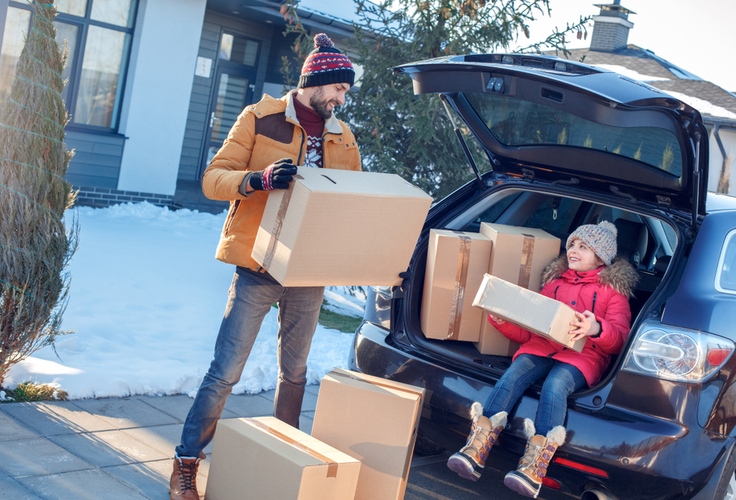our blog

Tips For Moving During The Winter
November 26, 2021
Relocating to a new house or apartment can be a chore, but moving in the winter months can seem especially daunting. The weather is cold and sidewalk conditions can be sloppy and dangerous. However, life is full of surprises, and changes in our personal and professional lives — such as marriage proposals or career opportunities — are just as likely to come in the winter as in fair weather.
There are benefits to moving during winter, when the weather is cold. The busiest time for movers is during the summer months, when children are out of school. Anyone who relocates during June, July or August will need to contend with their moving company’s busy schedule and possibly adjust their own schedule accordingly. Movers can even raise their rates when demand for their services is high.
However, the least busy time for moving companies is between November and the new year. If you relocate at the end of the year, you will be more likely to save money and move on your own schedule, not that of the moving company.
If you’re fortunate enough to be moving to a new home or apartment during the low-demand months, here are some winter moving tips to make the experience easier.
Tips for Moving in the Winter
- Be mindful of the weather forecast: Weather is unpredictable. When the local television weather forecasters predict winter precipitation, that could include snow, sleet, ice, rain, freezing rain or a combination of these, depending on the time of day. Check with your movers to see what their policies are regarding canceling and rescheduling a move because of bad weather.
- Shovel your walks and driveways: Your movers will be concentrating on carefully handling your belongings while navigating your front steps, driveway and sidewalk. They may also need to walk backward while carrying loads to the truck. Be certain their paths are clear of snow and ice.
- Keep your floors dry: Wet floors are slippery floors. Check your local home improvement store for floor-covering tarps that can be taped to the floor using removable painters’ tape. Don’t use towels because they can get wet and stay wet. Furthermore, towels can get bunched up and create a tripping hazard.
- Turn down the thermostat: Unless you post a friend or family member at the door during the load-out and make their sole responsibility opening and closing the door for the movers, your door will be standing wide open for several hours. If you’re moving in the winter and you don’t want to pay to heat the whole neighborhood, turn your thermostat down. Then, once rooms have been emptied by the movers, close the doors to those rooms to help them stay warm.
- Kennel your pets: Even the best-behaved dogs and cats can become frightened from having extra people and activities in the house — and the last think you want is your beloved pet to dash out the open door. Before moving day, make sure all pets are microchipped and wearing collars with identification. Kennel your pets in their crates and carriers while the truck is being loaded. If kenneling isn’t an option, reserve time for your pets at a pet-boarding facility or doggie daycare. Your pets will need to be up to date on their vaccines to spend time at a boarding facility, so ask your veterinarian’s office staff if they can forward your pets’ vaccination records to the boarding facility.
- Obey parking regulations: Check your city’s website for ordinances regarding parking moving trucks on your street. Whereas having a large moving vehicle in the road might not be a big deal during good weather, its reception might be different if snow is expected, and your city’s plows cannot get past your moving vehicle. If your municipality’s website doesn’t address it, contact your local street department.
- Use sturdy boxes: It’s great when you can re-use cardboard boxes that you received second-hand from friends or the supermarket. However, if you’re moving to a new residence in the winter and the weather calls for rain or snow, invest in new, unused boxes. They will likely be able to withstand getting wet better than boxes that are ready for the recycle bin.
Pro tip: For added protection from precipitation, place your important belongings in trash bags before packing them into boxes. Should the boxes become wet, your plastic-wrapped belongings should remain dry.
- Invest in rolling totes: In many cases, it’s easier to roll a container than it is to carry one. If you own valuable items that you don’t expect will pack well in cardboard cartons — such as family heirlooms or — pack those belongings in closeable, plastic totes on wheels. Your moving crew can roll those totes to the moving truck rather than carry them.
Pro tip: Be certain to pack the contents of your totes just as securely as you would if you were using cardboard cartons. Also, just because the totes are on wheels doesn’t mean their contents should be overloaded. Your movers will still need to lift the totes up and into their truck, so keep the weight at a manageable amount.
- Purge while packing: Relocating is the perfect time to rid your home of belongings you no longer need, especially if you will be paying your movers by the hour and there is an upcharge for a larger moving truck. As you pack, decide if your items should be kept, donated, recycled or trashed.
- Tip your movers: Moving heavy objects is tough work. It’s even more difficult during the winter, when the ground is slick and the air is cold. If your movers were prompt and did a good job, let them know by providing each with a tip. An amount between $4-6 per mover for each hour they worked is the typical rate during nice weather. Adjust your tip accordingly if they helped you relocate in the wintertime.
You might not be able to control the time of year you need to relocate, but you can certainly choose a moving company that cares about you and your belongings and strives to make the relocation experience easier for you and your family. In addition to carefully loading, transporting and unloading your possessions, New City Moving offers packing assistance that can include boxing your belongings and unpacking your possessions in your new residence. We also offer storage in our temperature-controlled facility. Contact us for a free estimate.




 800-733-6644
800-733-6644



